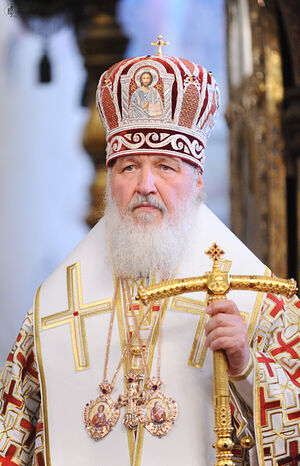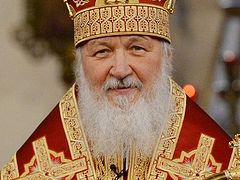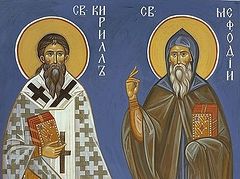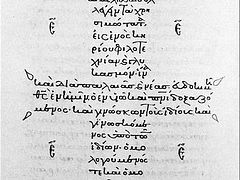May 11/24 is the name’s day of His Holiness Patriarch Kirill of Moscow and All Russia. As the feast of Sts. Cyril and Methodius, it is also celebrated as the Day of Slavic Literature and Culture. Below is a speech that Patriarch Kirill gave at the opening ceremony for the Day of Slavic Literature and Culture in 2011.
 Not too long ago, a huge pine tree fell near the house where I live. It weighed several dozen tons. It was so beautiful—a mighty tree that was more than 200 years old.
Not too long ago, a huge pine tree fell near the house where I live. It weighed several dozen tons. It was so beautiful—a mighty tree that was more than 200 years old.
When they started cutting up this pine, it turned out that the trunk was very sturdy, strong, and resilient, and it took them a while to figure out why the tree fell without any wind or hurricane. Then they found that just a foot or so off the ground, the trunk had rotted and separated the tree from its roots. So this mighty tree collapsed because it was cut off from its roots.
This is an image of what happens to a man, to a family, to a people, to a state if the root system is destroyed. There doesn’t have to be any wind, any earthquake, any war: Even a great country can collapse in a few days, and we witnessed this happening [to the Soviet Union] in the 1990s.
In order for a man, for an individual not to collapse, for a family not to be divided, to preserve the people, the state, we must not only preserve the fruit-bearing branches and gather the fruits, not simply admire the mighty trunk of the tree, but also remember and take care of the roots—because the roots maintain the tree. The roots are the foundation, including the life of a man, the life of the state.
Today we celebrate the feast of the Equals-to-the-Apostles Sts. Cyril and Methodius—those who, in fact, created our nation’s root system. They came to the Slavic countries to preach Christ. But unlike other missionaries who spoke Greek or even Latin, they, being enlightened Greeks, understood that the word of God must necessarily be transmitted to people in their own language.
But there was no written language—the people only spoke Slavonic! There were no grammar books—there wasn’t even an alphabet. And the holy Equal-to-the-Apostles brothers started creating an alphabet and soon translated the most important book—the Gospel—into Slavonic.
That’s where our roots are. And if we don’t remember these roots, if a significant part of Russia never opens the Gospel in their lives and doesn’t think about what God Himself said there, we’ll hardly be able to preserve our mighty tree undamaged.
This is my special word for the youth today. Don’t think of this past as something boring, out of date, indigestible for the consciousness of modern man. Don’t simply dismiss your root system. To be strong, to build a peaceful, just, happy life, remember that without the past, which lives in the present, there can be no future.



